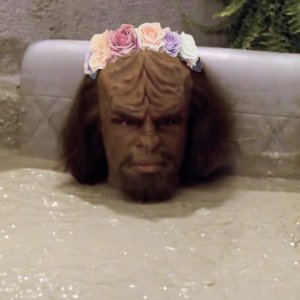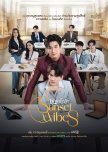
This review may contain spoilers
Not as Bad As Some Say; A Good Watch for Something Light
This series really wasn't as bad as some have said here. Overall, the series is well-acted by everyone with an interesting and fun romantic narrative and very strong visuals and cinematography. But, that being said, there are some obvious weaknesses in the actual story that left some unfulfilled potential, which is, what I think, are the main reasons why some have complained.The fantasy through-line about the Naga and its connection to the main characters wasn't as strong as it could have been. I felt like they were trying to draw a sort of karmic line between Lin and the woman who's soul is trapped by a past sin. This type of narrative works best when there are strong parallels between the characters, their circumstances, and their choices in the past and present. They tried to tie it together with the motif of jewelry making, which I thought was really interesting as object symbolism, but without a stronger narrative connection between these two lives and time periods, it left us unsure what the overall point of this storyline was.
Setting that all aside, the characters are all fun and the overall romantic plot is entertaining. It's not too complicated and works for what's presented. If I had to make suggestions, I'd just go with the above in terms of development as I'll always say that strong themes and characters make for exceptionally compelling storytelling. But this series really isn't that bad, especially if you're looking for something light to watch.
I'll also say that I'm happy to watch anything that features GL as I do think there is a disproportionate amount of BL compared to GL. Equality, people!!! I want to see it.
Was this review helpful to you?
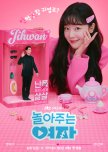
Does anyone understand that I was living for this series?
What can I even say about My Sweet Mobster that hasn't already been said? I was living for this series week to week. Everything about this series was so good that I wanted to weep tears of joy. I couldn't even write a review for this until now because I was too emotional that it ended. My only regret is that I can't ever watch it for the first time ever again.Was this review helpful to you?

Sincerely Loved it!
This series is silly, good fun. Full of fun moments with heartwarming, sincere storytelling. This is the kind of series that I'd like to point to as having a simple plot but making the most of it in seven episodes. Are there ways the series could have been expanded and developed further? Sure, but the story still works the way it is, and it has a good ending. It doesn't need to be too complicated — as long as it all still works cohesively, that's what I consider good, solid storytelling and a worthwhile watch.So 10/10 would recommend!!
Was this review helpful to you?

This review may contain spoilers
The Leads Carry This Series
I think a lot of other reviewers mentioned this, but the two main leads were really outstanding in their roles here. They had chemistry and I genuinely laughed out loud during several moments of this series. However, the story was lacking in my opinion, which made watching it a bit of a slog. This is so unfortunate as the lead actors were really amazing. What frustrated me the most was that the premise of Jun's character having an allergy to tears, though somewhat absurd, could actually be viewed in such an interesting light, but didn't quite get realized in the story.My thought on her tear allergy at first was that it was an obvious shortcut to create tension for Jun's entry into the investment banking world. But there were a couple of interesting points that were brought up but never really challenged that made me think that this tear allergy/inability to cry could have been an interesting way to explore some of the dynamics, especially gender dynamics, that were at play.
Yuan tells her early on that the kind of work they're doing is so difficult, time consuming, and often soul-crushing that only about 20% of the people working in investment banking are women; essentially, he says that this job is so difficult that a lot of men can't hack it, but especially a lot of women. Because, apparently, women are inherently mentally and emotionally weaker. For Jun, having an allergy to tears makes this kind of work dangerous to her health and well-being; apparently, women cry all the time when things are hard, and Jun doesn't even have that luxury. There's obviously some very patriarchal ideas at play here. Obviously, Jun proves that she can succeed because she's not the same 'weak and timid' girl Yuan knew in their schooldays. She proves that she's learned how to control her emotions better and that Yuan needs to get to know her again before making any judgments. But I thought it would have been interesting if the narrative challenged this initial premise in a more nuanced way.
For one, the idea that crying proves some kind of mental or emotional weakness, especially for women because, apparently, men don't cry (mmmhm) could have been looked at more closely. And, secondly, that the reason for a lack of gender parity in this field is that the majority of women are somehow too weak to handle it could have been examined through the lens of the first point.
For Jun to succeed in this field, she must prove that she won't cry; at least, that's the standard that Yuan holds her to at first. This is the part that seems the most absurd to me; the metric here being that if one sheds tears because things are hard, that one is unfit to deal with those hard things. For both men and women this type of gendered idea about crying is especially heinous for reasons I don't think I should have to get into. The narrative somewhat challenges this by showing that Jun is not just capable but talented in her work; even if she cries because something terrible happens to her (the mugging that happens early on for example) she can still do her job and do it well. But, I think the crux of this very idea about whether crying is acceptable or not gets lost in the premise of Jun's tear allergy. If she cries, it's literally dangerous to her, which lets Yuan's character and the audience off-the-hook for thinking she's unfit because of her "feminine emotions"; he's just concerned about her well-being. So, instead of facing the very idea of crying as being both inherently feminine and a sign of mental/emotional weakness, the narrative avoids it entirely.
Secondly, the lack of gender parity that Yuan cites early on was something that should have been challenged more in the narrative. Is it that women are just not as fit to do investment banking or are there very gendered conditions that exist that are the real reason? The narrative touches on the truth here in so many ways without even realizing it. For example, there's a storyline early on about workplace sexual violence. Jun discovers that a young woman in an entertainment company is the victim of sexual violence by the CEO. They use this to oust him from his role there. Another example happens later on when a colleague forces Jun to entertain and drink with a client. While toxic drinking culture isn't inherently gender-based, gender still comes into play here. Jun isn't just targeted and forced to drink exorbitantly by this client for being the newbie, but she's also sexually harassed in this scene as well. This hazing takes on another layer because she's a woman; they treat her as though she should act as an escort to their male client. But this touches on an important aspect about women in the workplace; sexual violence and harassment are a very real issues in many industries. Such issues make those workplaces unfair, toxic, and even dangerous for women to work in.
Then there's the underlying issue about working women, in general, and romance. When one of the other characters finds out about Yuan and Jun's relationship, she warns Jun that they should be careful; if it's found out, Jun will be the one who has to leave. Later, towards the end of the series, Yuan pressures Jun to resign because she's being so overworked her health is suffering as a result. While, Yuan walks this back later on, both of these points in the series illustrate one of the key issues at play here. When it comes to love, marriage, and starting a family, Jun's career can and should be sacrificed, because her first priority should be being a wife and mother. There's too many compounding and complex issues related to this very idea that I won't go into, but it does speak to the reality for many women in the workplace: that women are treated like they don't actually need to be there.
But rather than really explore some of the themes laid out initially, the series deviates through so many predictable and flat storylines, love triangles, and side couples. Jun doesn't even get to participate in the most consequential storyline related to her own character; once again, the men take charge and leave her out about finding the truth about her father's death. Instead, Jun is forced to navigate petty jealousy from colleagues and really... nothing else. She holds back her tears, because crying is weakness in this shark tank of a business (but also she has an allergy!!!1!). A lack of gender parity in a workplace is sometimes not because women can't do the job, but rather because there's often a gendered culture that is prohibitive towards women even being there. But if you cry about it? You're just proving them right.
Was this review helpful to you?

A bumpy ride for me
Copied from my Viki account:This series was overall just okay. The acting was excellent in many areas. I thought Esther Yu shined the brightest when she got to play the comedy up for her character. Vin Zhang seemed to be genuinely holding back laughter in some parts. However, the storyline and themes were a bit disorganized. The set up was kind of messy and unclear, which I'm sure is in part because some things seemed to be lost in translation. It hit a bit more of a stride toward the middle, though. It was stronger when it focused more on topical issues of beauty, intelligence, and the unfair standards and assumptions people can make about others—especially women. I felt like the narrative romance between the two main characters would have been stronger if the series focused in more on those issues as they related to Yu Meiran. They should have let Vin Zhang's character be more fallible in this respect to make the overall message stronger. Basically a missed opportunity.
But I think C-Dramas tend to suffer from these binary gender assumptions/roles a lot; there's an effort to challenge it, but so many times the writing falls back on this idea that 'men are smart and strong. women are dumb and weak'. Seriously, if I had a dollar for every time I heard a character say 'women are this way and men are this way'.... And even if you do have a 'smart and strong' female character, they become 'maiden-ized' to give the male lead opportunity to play his role as the chivalrous romantic partner. That's when I think they take an interesting premise and interesting characters and make it boring and lose the plot.
Was this review helpful to you?
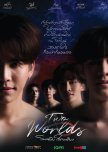
This review may contain spoilers
A lot going on but interesting and worthwhile
Overall this series is pretty good, but does have a lot going on plot-wise that made it a little muddled in the middle. It did bring it home at the end and I was like, "okay, cool!"I was interested in this series because of the two main leads; I think their chemistry as actors is really good from doing Cutie Pie and Naughty Babe. This series is very different in genre and style from those two works so that's a refreshing change, I think. However, I would say that there was a LOT going on for ten episodes—to the point where I was kind of hesitant with where it went. Once they delved into the gangster storyline with Tai and said that Tai's Original Universe Counterpart killed Kram's mother, I was like 'okay, you had me but now you're losing me.'
I really think that the story would have been stronger if they stuck with, and dug deeper into, the conspiracy plot and Phupha's murder instead of detouring into the Big Slum gang stuff. They do kind of set up the gangster stuff in the beginning, BUT over the course of the episodes it becomes a lot to go through when the main plot of Phupha's murder is already interesting enough to get us into the story. That being said, it could have gone either way. Mostly, my critique here is about the focus of the narrative. There was a lot of plot-points that are run through quite quickly and any one of them could have been developed more and stretched out to fill the story for 10 compelling episodes.
Now the supernatural/sci-fi element of going to an alternate universe was super interesting to me. But it didn't go where I thought, and I was a little disappointed. Not that everything has to meet my expectations, but based on everything that I watched, I really do think this aspect of the narrative would have been stronger if they used it to more thoroughly explore the conspiracy plot and reveal more about the characters than what we're led to believe from the beginning. Putting a character in a situation where everyone they know is now de-familiarized can be a great narrative tool to explore how the perceptions of what we think we know about various characters and events can be flawed.
Which leads to me to the Tai thing. I really found it hard to believe that Kram was so quick to think that 1) Tai was different and 2) not be scared of him anymore. Yes, in this universe Tai does not have a scar on his face, so that's a big difference. But, I felt like there should have been resistance and confusion on Kram's part to believing that this was a totally different person. Moreover, Kram believes that Original Universe Tai killed his mother, and I had to think this would definitely color Kram's perception of Tai in that respect. It gets revealed at the end that Original Universe Tai didn't actually pull the trigger, and Kram tells him that he started to think he didn't once he got to know the other Tai, which sort of comes unexpectedly. I wish that was a more prominent point that developed sooner so we weren't thinking the entire time that Tai killed Kram's mother in the original universe.
Then it gets into another arc where Kram gets sick. I kind of thought this mysterious illness had something to do with the fact that he's from another world, but no? That also felt like an odd detour plot-wise. And by this point, the series actually resolved the main plot of Phupha's would-be murder. So this kind of gets thrown in there to bring more tension to Tai and Kram's relationship and the fact that Kram has, up until the last episode, basically abandoned his original universe. What pleasantly brought it back for me was the final two episodes where Kram returns to his world and then Original Universe Tai ends up having to sacrifice himself to save him from this illness. It makes an interesting arc and parallel here seeing both Tais save Kram. So while this Tai is still a Bad Guy, he does end up getting a kind of redemption here, which leads Kram back to his better counterpart. In that way, I think the series did hit on what I was really looking for in an exploration of different sides of the same character.
I mean, all of this is just to say that I really felt like there were some missed opportunities to dig into what the story had already set up. By the end, I do feel like there was a strong point about these alternate connections between Tai and Kram, which did wrap up in a thoughtful and interesting way, but I still feel like that could have been made stronger with more development between them from the beginning instead of as much emphasis on Kram and Phupha. There was just a lot of other plot stuff going on, so I do end up thinking about all the ways the narrative could have been strengthened to make that arc more poignant and satisfying.
Overall entertaining and pretty good. Just fell a bit short, but that's okay and not a dealbreaker honestly.
ALSO. I'll just mention Pai (is that right?) goes through a whole dumpster fire of injuries in this series. I mean, he was shot, stabbed (multiple times???), tortured, had his leg impaled on an animal trap???? and then somehow managed to have sex with that other guy??? like, with a leg injury????? My dude needs stitches and a tetanus shot. That's all I was thinking.
Was this review helpful to you?

This review may contain spoilers
Interesting premise but lacks a strong follow-through
I got to the start of episode 22 and was thinking a lot about how I was really bored by this point in the series. I ruminated on why I got so bored, when the series had, to me, a strong premise, and I have a few thoughts.First, though the premise itself was strong, the opening of the series was difficult. Mainly because Lucky Tang's character was introduced to us in such a bizarre and off-putting way. If you started this series and were totally put off by her actions, I can guarantee you that this weird entitled behavior of hers gets dropped pretty much after the first episode. I have no idea what the writers were thinking by introducing her character to the viewers in this way, especially considering what you learn about her in the following episodes.
Which leads me to the main thought I had regarding this character and this series. What we learn about Lucky is that she used to be a highly skilled programmer at a top software company, but this career ended because a couple of factors: her best friend died of cancer; her mentor unexpectedly died as well (I can't remember why); and her boyfriend, who also worked with her, cheated on her with a woman whose father owns this software company (this was actually fuzzy, but it's what I remember). As a result, a demoralized and grieving Lucky decides to quit her job and move back to China to start a new life. She takes a job as a receptionist in another software company, not giving her real resume, because she says she doesn't want a 'career' anymore; she just wants a normal job that will pay her bills and not make her life difficult. This company turns out to be run by an old childhood friend, whom she doesn't recognize yet, Lu Zhiyi. This is her main love interest.
To me, this is all super interesting and intriguing as a set up. But there are a couple of issues and some missed opportunities here. For one, if Lucky wants to really get away from her old career, why would she take a job at another software company? I really think this was a too obvious way to create drama for Lucky. By doing so, she ends up still in her ex's orbit (though on the periphery), which seems like a strange move when she wants to hide the fact that she's a programmer and get away from him. And when more drama unfolds at her new job, I just kept feeling like she should quit. If she really didn't want to end up in the same place she was before, why would she put herself in a position where that could happen?
Second, in regards to career vs jobs. I really thought there was something interesting being said here about the way we perceive success and hard work. Lucky's personal losses really seemed to put into perspective for her the preciousness of life. There was an implication here that real fulfillment doesn't necessarily come from career achievement, but rather by spending as much time with your loved ones as you can and having fun. Her personal goal of reliving her childhood and finding childlike joy in life, seemed like it could have been more poignant if it was more developed as the main drive of the series. Later, it comes up that she want to build an app that would help adults relive their childhood, which ends up being a project at Lu Zhiyi's company. I was kind of disappointed by this. I kept thinking that she could just build this app by herself (plenty of people build apps independently), which would have made more thematic sense than relying on her boyfriend's money and resources. Why did it end up seeming like Lucky couldn't actually achieve anything without, you know, a man? (eyeroll).
Then there's the question of the ex and the woman who is now his wife. Again, this was all kind of fuzzy to me, but I felt like it was implied that a) he cheated on her with this woman to get ahead and b) this woman used her wealth and position of power to make Lucky's life miserable. I really felt like if they made these two implications stronger and then made that a central theme to the romantic drama, this series would have been so much more compelling. Especially when her new love interest's ex girlfriend, Gu Ling shows up. I'll preface this by saying that the actress who play Gu Ling really did an amazing job at making her the most unpleasant person on the planet. Gu Ling is a wealthy heiress who is a big shareholder of Lu Zhiyi's company, and she comes in basically on a mission to get Lu Zhiyi back and crush anyone who stands in her way. I mean, I could talk about the Ex Who Won't Let Go trope, but I won't because what's the point. What I will say was this was a perfectly missed opportunity to create a dramatic parallel between this situation and Lucky's previous situation. In both instances, a more powerful person uses their wealth and privilege to make her life a living hell. The emotional difficulty for Lucky would be to reconcile these situations and see that they aren't the same, but also to have a moment of relief at being able to take back her own power, therefore overcoming the emotional trauma of what happened before.
The fact that this was so obvious to me, but was completely missed in the story, seems to me a case of just reductive laziness. Instead, we get trope after trope after trope and not enough compelling character drama that feels like it's actually saying something. So by the time Lu Zhiyi and Lucky get together, I feel bored. From the way the series developed, you'd think the only point of conflict was whether or not these two crazy kids would work it out, so when that happens if feels like there's really nothing left to watch. In that respect, the series took an interesting premise and characters and flattened them out until they were nothing but stock characters playing out trope-filled plot points. And while there were some fun moments, I'm disappointed by its unfulfilled potential. So, unfortunately, I'm not going to continue watching. :/
Was this review helpful to you?

A wonderful masterclass in Unreliable Narrator
I'm actually rewatching this series right now, and I'm reminded how well-done this story was overall. I think, just to say a little bit here without really being spoiler-y, that the thing I love the most about this is that it's such a unique and interesting example of an unreliable narrator. I feel that some might get the wrong idea after the first episode based on the main character's inner narration; but watch closely and you'll start to notice that the action and dialogue do not align with what he's narrating. Rather, his narration becomes more like a reflection how he feels about himself, which becomes more evident through each episode. I just love the way that the story brings us into this relationship and shows us depth of character through that unreliable lens. Really just a masterclass in character-driven story in just 8 episodes.Was this review helpful to you?

A very charming and sincere adaptation
I remember watching the Korean version of this years ago, so I was very interested in seeing a Thai version. This series was so sincere and heartwarming. All of the leads were so good in their roles; the lead actress is just so charming and really was just outstanding as Jiw. I already loved the Korean version and the Thai version is just as good, which was so great to see. Amazing work to everyone who worked on this.I also want to mention that the music was really good. It's been so long since I've seen the Korean version, so I can't remember if they used the same music, but in any case it's really good. It just really stuck out to me this time.
Was this review helpful to you?

This review may contain spoilers
Challenging but worth it
I didn't want to get too detailed, but okay let me be real I have Thoughts.The narrative explores the themes of guilt and regret and asks each character to look at their life and choices through the lens of the mysterious moments, the four minutes, between life and death.
What's challenging and provocative, I think, about this series is the non-linear narrative, which appears, at first, very tangled and confusing. However, this series unravels those tangled webs of time and memory and provides us with, in actuality, a very simple story. The non-linear approach effectively shapes that simple story about the follies and sins of its characters into a rumination on the unknowable mysteries of consciousness, memory, and imagination. Using memory as a vector, the series takes moments from its characters' past, connects it to their present, and transposes them into the "4 Minutes" dreamworld: the intangible, fourth-dimensional liminal space between life and death. This space crosses the boundaries of consciousness and imagination itself, with characters reliving past moments, making changes to their own memories and even, seemingly communicating with each other through shared imagination.
One character quantifies this into his "4 Minutes" theory, exploring the idea that these moments between life and death can reveal a person's true character, or at least who they want to be. At the same time, the Real World looms over, telling us that no one can change the past, letting each regret hang over like an executioner's axe. As the series progresses, we're painfully aware that Great couldn't actually do anything to change the events that preceded his near death experience, that his experience in the 4 Minutes was just his regret and imagination at work.
Still, though this is the 'truth' revealed about 4 or 5 episodes in, we're still left with many unknowns about these 4 minutes. Indeed, in a very fitting ending, we're left questioning some aspects of what was real and what was in these 'dreams'. If it was simply "imagination", then why did it seem as though characters learned things they didn't know before? Or seemed as though they were having a shared experience within the 4 minutes?
The series never really aims to answer these questions and so doesn't, because the real heart of the story isn't to give a definitive answer to these mysteries but rather to answer the question of whether, given the chance, a person would change themselves for the better. And so, a change does happen; perhaps Great couldn't change the past, but he could and does change his future, which is, ultimately, what saves his life in the end.
Was this review helpful to you?

This review may contain spoilers
An adorable and hilarious series!
This series was so fun and genuinely had me laughing out loud. I absolutely loved the practical effects used, especially in those old-timey movie-esque dream sequences and the lore of the alien pig curse. I sometimes get wary of some fantasy in contemporary setting because they often end up being quite angsty but this was not that. It was appropriately absurd and sincerely heartwarming.I also loved how they immediately went in like 'we know this appears to be another CEO/employee drama but' and then proceeded to subvert that trope in a number of ways. First, I was pleasantly surprised that Yang Xiaoyang and her friend were both appreciated for their ideas and skills. I also appreciated that the boss character wasn't just idol-ified. He was appropriately chastised for his terrible behavior towards his employees. This is one of those things that I loathe from other CEO dramas. If my boss was as much of an asshole as some of these C-drama CEOs are, I would quit and genuinely think that person was a sociopath. Being good-looking and rich is, like, not even a factor.
Another moment of subversion that I appreciated was when we learn that the Yang Xiaoyang is actually really rich; she just didn't know it! She apparently has this huge inheritance that her parents didn't tell her about. It was such a funny moment because I know that it was specifically supposed to subvert the whole rich man/poor woman dynamic and just immediately put him back down on planet earth next to her. It's not really about artificially raising her up, but instead being like 'yeah he's rich, but so what?'.
I also really appreciated that they decided to show how awkward it would be if you thought you HAD try falling in love with a person you don't actually know at all. It was only until they started trying to be normal about their relationship and working on getting to know each other as real people that things became less awkward. It was also refreshing to, at least subtextually, have this idea that it wasn't 'fate' or 'destiny' but rather a choice on both their parts to try and be together romantically.
My absolutely favorite piece of this was the curse lore as explained by his mother. It was so funny and absurd. I really think all curses should be like this. I will die on this hill.
My ONE critique would be that I actually wished we saw more of their just hanging out. I mean, there's a bit of a flashback in the last couple eps where she recalls the fun times between them, and I was like, 'wait, can we see more of that?'. Because we got the awkward forced dating but then I really wanted to see that they eased into being friends and stuff. Do they have fun together? What do they laugh at? Do they have a similar taste in movies or tv shows? What I do appreciate is that they showed that the two of them really worked well together. They found out that they have similar goals and then really played to each other's strengths. And in fact, the male lead was like, 'I can't wait to get to that sweet moment of making new products together'. That was such a great character moment I thought.
All in all, I really do think this was such a solid series totally worth watching.
Was this review helpful to you?
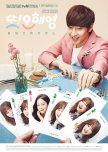
Lives in My Mind Rent Free
Copied from my Viki:This drama has lived in my mind rent free since 2016. I re-watched it and somehow it was more unhinged than I remember. I don't think I've ever laughed so hard and felt so deeply in the span of 18 episodes. If I had to pick some things of Cultural Importance to show aliens, this would be on the list. Truly a Masterpiece worthy of study.
Was this review helpful to you?

Here for this series.
Copying from my Viki account:I give this series 10 though I have Thoughts. First off, let me just say that the chemistry between the actors playing Rain and Phayu was off the charts; they really brought 1000% to their roles and the romance. My main beef with this series, though, is that there are two separate narratives in the first and second half as a result, it feels more like two, 6-episode mini series that got squished into one. I really think they should have made two distinct series and then expanded each storyline to 10 or 12 episodes. Because I definitely would have watched more Rain and Phayu if there was more—especially if they gave us more build up to their relationship. It's very good as-is, (they really crafted a tight narrative and told it well) so I only say this because I really wanted more!! I liked it that much!!
The second half, I'm more lukewarm on. I appreciate how this series wanted to tackle issues of abuse and trauma, but that's really not the kind of story for me. Some people might have mixed opinions on whether the show did it well or not; I'll just say that I don't think there's one Right Way to portray these types of stories, because I know personally that people's lived experiences and feelings with similar traumas can vary widely. That all being said, while this part of the series wasn't for me, it definitely could also have benefited from being its own series with an expanded storyline to more fully realize its potential and have more space to explore those issues.
Overall, super fun and amazing series. Wish there was more!
Was this review helpful to you?

